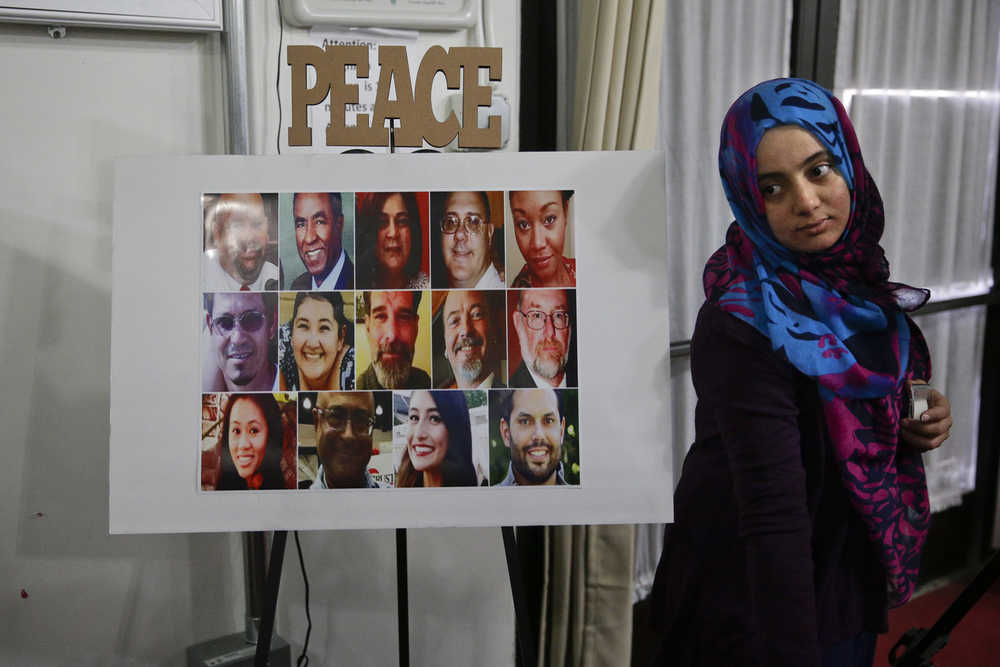WASHINGTON — Islamic State propaganda is resonating with a growing and loyal following of young women and teenagers, complicating U.S. counterterrorism efforts to identify and monitor supporters such as Tashfeen Malik, the 29-year-old mother suspected in the California shootings along with her husband.
It’s unusual for a woman to be involved in mass violence in the United States. But the increasing number of women drawn to IS is worrisome to American law enforcement and making it almost impossible to flag the prototypical recruit for investigation. Even harder to detect: a husband and wife team, like the one blamed for Wednesday’s shootings in San Bernardino, that doesn’t need to use a telephone for attack-plotting.
“The challenge of our efforts to try and find and redirect people is that it is a wide spectrum of folks,” FBI Director James Comey said Friday. “It isn’t a particular demographic or geography. It’s about people seeking meaning in their lives in a misguided way.”
In the U.S., men by far account for the largest percentage of supporters of the Islamic State group. But authorities are concerned that the number of women supporting extremist ideology is on the rise.
Before the most recent attacks, the Anti-Defamation League had identified 15 women linked to Islamic extremist activity in 2014 and 2015 — a higher total than in the entire prior decade. A recent George Washington University report on IS found that one-third of the nearly 300 Twitter accounts of U.S.-based IS sympathizers monitored during a six-month period appeared to be operated by women.
Most recruits had tried to join IS on its home turf, including three teenage girls from Colorado who were intercepted in Germany last year and a 19-year-old Mississippi woman who the FBI says set off with her love interest before being stopped at a regional airport. Others are accused of planning violence: In New York, two women were charged in April with plotting to build a bomb for an attack.
“Unlike in the Middle East or even Europe, it is indeed rare for a woman to be involved in such a shooting in the U.S.,” said Oren Segal, director of the ADL’s Center on Extremism. He said IS “has made it a priority to reach and recruit women, so perhaps we are starting to see the results of those efforts.”
There’s no single answer for why the group has succeeded in attracting women, but law enforcement officials cite propaganda directed at that population. Even as IS spotlights decapitations of captives, recruitment videos that show smiling children paint a family-friendly portrait and suggest a role for women who join the self-described caliphate in Iraq and Syria.
The goal is to entice women to become brides for the jihadi fighters and help expand the group’s regional dominance.
IS “likes to say it’s not a terrorist group, but it’s really a state or a movement,” said Max Abrahms, a terrorism expert at Northeastern University.
The FBI is investigating the shootings at the social services facility in San Bernardino as an act of terrorism. Comey said agents have found signs of radicalization, though no indication that the couple was part of a larger cell or network.
At the center of the investigation is Malik, born in Pakistan and described by family lawyers as a quiet and devout Muslim who moved to the U.S. in July 2014 and married a month later.
A U.S. official says she used a Facebook alias to praise the Islamic State in a post around the time she and her husband, Syed Farook, opened fire in combat-style gear on a holiday party of his co-workers. The official was not authorized to discuss the case publicly and spoke on condition of anonymity.
It’s rare, though certainly not unheard of, for husband-wife pairs to team up in violence.
Among the more recent examples is Jerad and Amanda Miller, who harbored extremist views and went on a June 2014 shooting rampage in Las Vegas that left two police officers and a civilian dead. The Millers died in a shootout with police.
Before that were Holly Grigsby and David Pedersen, a white-supremacist couple now serving life sentences in connection with the 2011 murders of four people in Washington state, Oregon and California.
Perhaps not surprisingly, even the most sophisticated electronic surveillance tools can struggle to pick up a plot hatched by a couple who spend hours communicating face to face in the privacy of their home.
“Usually when terrorist plots are broken up, it’s by intercepting communications among members. But if they’re living together, it would be much harder,” Abrahms said.
“They don’t need to leave the house,” he added. “They don’t even need to leave the bed.”
___
Follow Tucker on Twitter at http://www.twitter.com/etuckerAP
___
Associated Press writer Tami Abdollah contributed to this report.

